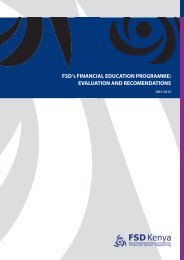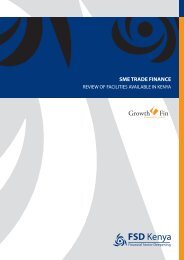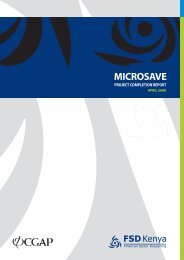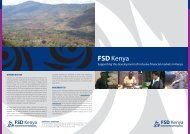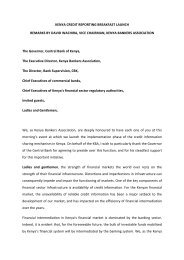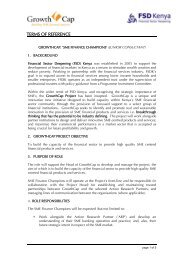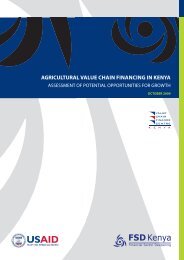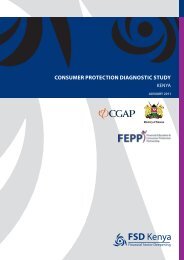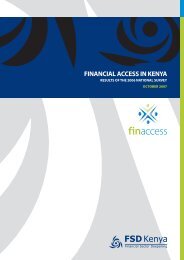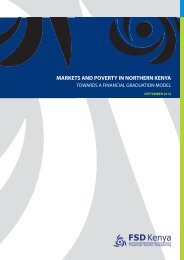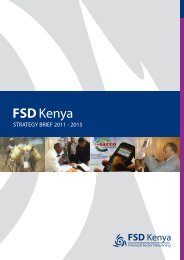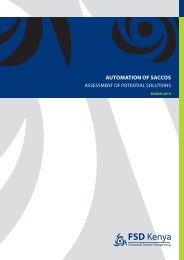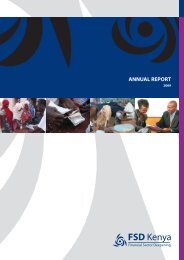FINAL REPORT - FSD Kenya
FINAL REPORT - FSD Kenya
FINAL REPORT - FSD Kenya
You also want an ePaper? Increase the reach of your titles
YUMPU automatically turns print PDFs into web optimized ePapers that Google loves.
which one would you<br />
prefer? Why?<br />
sending or receiving money<br />
v. Focus Group Discussions with OVC Beneficiaries in BALAMBALA DIVISION<br />
Point of discussion Discussion<br />
What are the difficulties you<br />
face in taking care of these<br />
children?<br />
How have you been able to<br />
solve some of these<br />
difficulties you face in taking<br />
care of these children<br />
If you were to send or receive<br />
money from your relatives,<br />
Lack of clothing-Respondents high cost of purchasing clothing for their<br />
orphaned children considering the high number of children in each<br />
household-“maugathi karta unug walba daar adhi oo sabool”- can you buy<br />
clothing for every child when you are poor?<br />
Lack of food. Here farming is done on a small scale along the shores of<br />
Tana River. Millet is mainly planted. However this can not meet the house<br />
hold feeding needs, leaving the house hold depend on food rations from<br />
world food programme and government. Due to bad roads and distances<br />
involved some of these rations take long to reach the area. Other sources<br />
of food are animal products like camel milk and meat. However due to<br />
the recent draught, animals were reduced considerably. Most families as<br />
of now don’t have even a single animal<br />
High education costs. Education-books, uniform, secondary and tertiary<br />
institutions costs. “Non of my three children who graduated from primary two years<br />
ago, has managed to go to secondary school and are currently at home” said Dubow<br />
Yusuf.<br />
Cost of secondary education is about KShs2,000 per term.<br />
In-accessibility to health institutions-The nearest district hospital is about<br />
200km from Mbalambala and hence transport cost is costly and<br />
unaffordable. The only available transport is an old land rover<br />
“Mbalambala liners” plying Garissa – Mbalambala after every two days<br />
during dry seasons and un- predictable during rainy season. Transport<br />
charges ranges from Kshs400 to 500 per person exclusive of meals on the<br />
way, which may cost about Kshs300 by the time the passenger reaches<br />
Garissa.<br />
Poor shelter. Respondents stay in temporary makeshift huts called “herios”<br />
These are Somali traditional temporary shelter. They normally leak during<br />
rainy seasons. Due to the architectural design of these huts, snakes have<br />
also taken habitation in these shelters thus causing deaths due to<br />
snakebites. Mosquitoes are also common since they can enter through the<br />
many holes in the hut. At least each family has been given mosquito nets<br />
by aid agencies to counter the mosquito menace.<br />
Lack of water. The major source of water is Tana River but it’s a distance<br />
and the water is dirty and not good for consumption. A jerry can of clean<br />
water costs Kshs10, which is very expensive for most households. This is<br />
got from the boreholes, sunk through the Pastoral association; by the<br />
government through the Arid land Project.<br />
Most women go and pick firewood for sell in order to earn some little<br />
income to meet basic needs. Others operate small groceries.<br />
Those with no income at all have resorted to seeking support from<br />
relatives, friends and well-wishers. Somali tradition encourages well off<br />
people to support others. This has greatly benefited families who have<br />
nothing to at least be able to meet some basic needs.<br />
Use of animal skins and locally assembled logs as beds. In addition<br />
shelters have been re-enforced with polythene covers from Aid agencies,<br />
which are used to shelter occupants from rain.<br />
Depending relief handouts from NGO,s such as <strong>Kenya</strong> Red Cross and<br />
CARE <strong>Kenya</strong>.<br />
• By hand delivery. Sending someone to the recipient<br />
• Use of matatu. Landrovers plying Mbalambala route.<br />
26



